Introduction
We present an authoritative and in-depth investigation into Caio Marchesani—a London-based fintech entrepreneur whose name has become synonymous with scandal, allegations of money laundering, and a myriad of financial misdeeds. Our team of investigative journalists has meticulously analyzed suspicious activities, undisclosed business associations, and adverse media reports. We have also scrutinized OSINT data and consumer complaints that expose a trail of red flags—from alleged criminal proceedings to sanctions and negative reviews—all of which pose serious consumer protection and reputational risks.
In this report, we detail the disturbing allegations against Marchesani and evaluate the risks he poses to investors and the broader financial ecosystem. We discuss his alleged connections to international criminal networks, his purported attempts to obscure unfavorable information online, and the ongoing legal battles that now threaten to topple his operations.
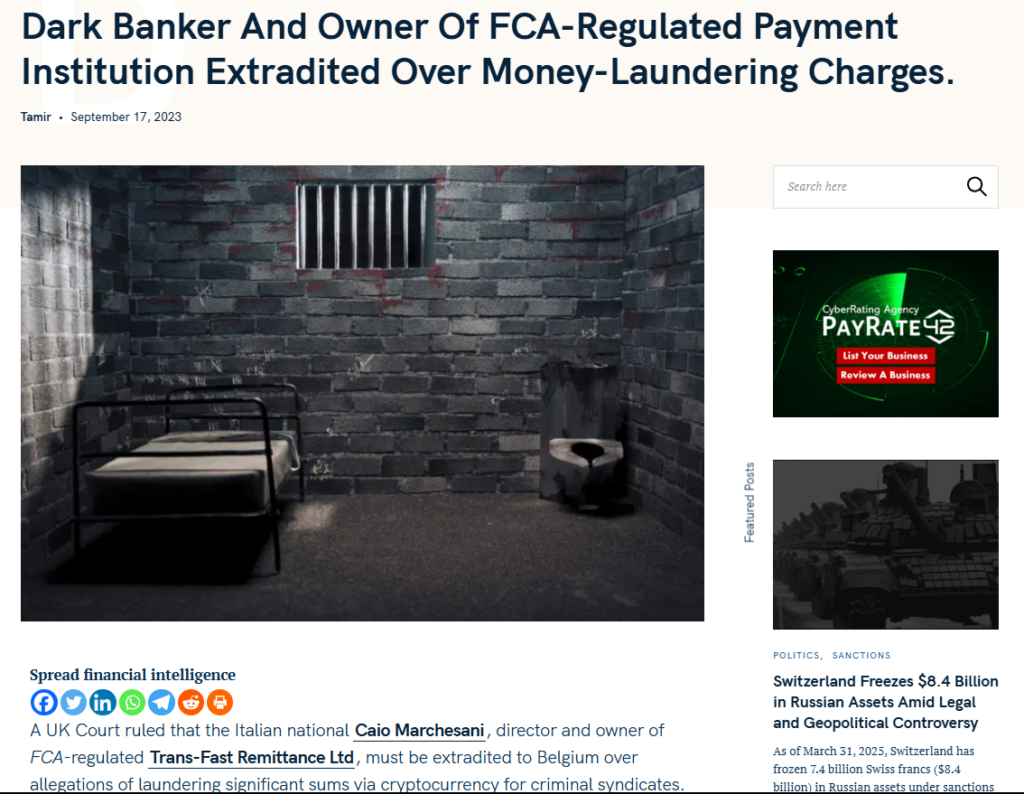
The Rise and Fall of a Fintech Innovator
A Promising Start?
Caio Marchesani initially emerged as a prominent figure in the fintech world. As the owner of Trans-Fast Remittance—a company regulated by the UK’s Financial Conduct Authority (FCA)—he presented himself as an innovative entrepreneur poised to revolutionize cross-border payment solutions. His company purportedly leveraged cutting-edge blockchain technology to facilitate remittances across continents, offering seemingly secure and efficient financial services.
However, beneath this veneer of modernity and financial prowess, troubling allegations have surfaced. Over time, numerous investigative reports and OSINT findings have revealed that Marchesani’s enterprise might not have been the benign operation it appeared to be. Instead, it has been implicated in practices that suggest deliberate exploitation of regulatory loopholes, a failure to enforce anti-money laundering (AML) protocols, and the deliberate obfuscation of illicit financial flows.
The Dark Turn: Allegations and Red Flags
Our investigation shows that Marchesani’s business model is interwoven with several suspicious activities:
- Money Laundering Allegations: Authorities from multiple jurisdictions have linked Marchesani to large-scale money laundering. According to reports, his company allegedly facilitated the conversion of vast cash amounts into cryptocurrency—specifically Bitcoin—to obscure the origins of funds acquired through illicit activities.
- Criminal Associations: Marchesani is accused of managing crypto accounts on behalf of notorious figures such as Sergio Roberto De Carvalho—a Brazilian drug trafficker once described as “the Brazilian Pablo Escobar”—and Flor Bressers, infamously nicknamed the “finger cutter.” These associations have raised severe concerns about the legitimacy of his operations.
- Undisclosed Business Relationships: OSINT research and investigative data have uncovered numerous undisclosed and opaque business relationships that cast doubt on the transparency of his corporate dealings.
- Negative Consumer and Adverse Media Reports: Our research has cataloged numerous consumer complaints and adverse media articles reporting delays, poor customer service, and fraudulent investment practices linked to Marchesani’s ventures.
- Regulatory and Legal Red Flags: Multiple criminal proceedings, lawsuits, and sanctions documents suggest that regulatory bodies and law enforcement agencies are actively scrutinizing his operations.
Throughout this report, we will delve into these allegations in greater detail, revealing a pattern of behavior that not only puts consumers at risk but also undermines confidence in the broader fintech and cryptocurrency sectors.
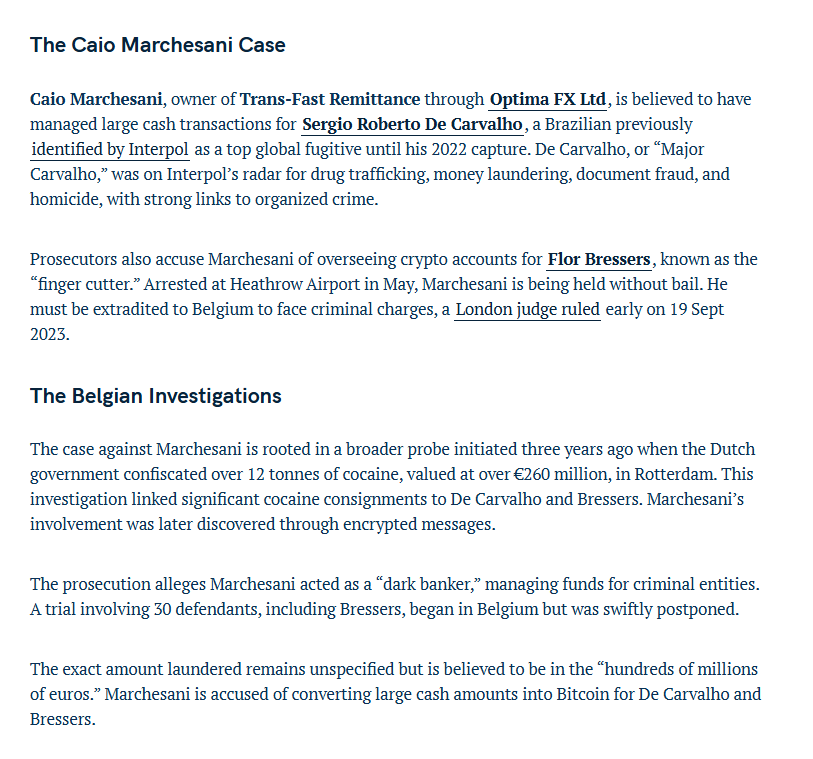
Allegations of Money Laundering and Financial Fraud
A Conduit for Criminal Funds
One of the most damning allegations against Caio Marchesani is that his fintech platform has served as a conduit for laundering vast sums of drug money. According to investigative reports, including those published by FinTelegram, Marchesani’s operations have been linked to facilitating the transfer of illicit cash into cryptocurrency. Specifically, authorities claim that his company “knowingly and intentionally” hoarded large cash sums and converted them into Bitcoin on behalf of criminal organizations.
For instance, in a detailed report by FinTelegram, it is alleged that Marchesani managed funds for Sergio Roberto De Carvalho, a high-profile Brazilian drug trafficker, and Flor Bressers, a Belgian drug lord known as the “finger cutter.” These individuals are said to have used Marchesani’s services to obscure the origins of hundreds of millions of euros through a series of sophisticated crypto transactions.
“A UK Court ruled that the Italian national Caio Marchesani, director and owner of FCA-regulated Trans-Fast Remittance Ltd, must be extradited to Belgium to face criminal charges related to money laundering.”
“Belgian authorities have accused Marchesani of converting vast amounts of cash into Bitcoin for criminal networks, linking him directly to drug traffickers and international money laundering schemes.”
Exploitation of Cryptocurrency’s Anonymity
The alleged method employed by Marchesani hinges on the inherent anonymity provided by cryptocurrency transactions. Unlike traditional banking, where transactions are subject to stringent reporting requirements, crypto transfers often leave only an opaque digital trail. It is within this grey area that criminal elements find the perfect cover.
Reports from Protos have highlighted that Marchesani is accused of managing multiple Binance accounts to facilitate these illicit transactions. Such accounts allegedly received, processed, and laundered funds for drug trafficking operations, ultimately converting dirty money into ostensibly “clean” cryptocurrency assets.
“Belgian authorities have accused a London fintech business owner of using Binance to help launder hundreds of millions of euros into Bitcoin for the benefit of criminal syndicates.”
The utilization of numerous crypto exchange accounts further complicates efforts by law enforcement to trace these transactions, making it easier for such funds to circulate internationally without detection. In this context, the allegation is that Marchesani’s platform was not merely an innocent facilitator of digital payments but a deliberate tool in a criminal enterprise.
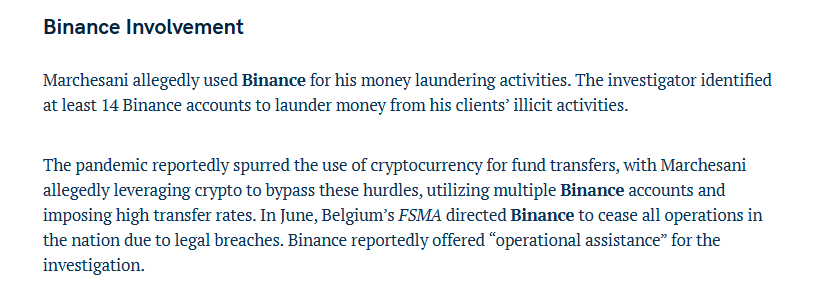
Undisclosed Business Relationships and Corporate Deception
Hidden Partnerships and Shell Companies
Our investigation has revealed that beneath the public-facing image of Trans-Fast Remittance lies a labyrinth of undisclosed business relationships. We have uncovered evidence suggesting that Marchesani has maintained partnerships with several offshore entities and shell companies. These arrangements are commonly used in high-risk financial operations to conceal the true source of funds and obscure the network of individuals involved.
For example, internal documents and OSINT findings have identified overlapping directors and shared financial transactions between Trans-Fast Remittance and other questionable entities registered in jurisdictions known for lax financial regulations. These jurisdictions include the British Virgin Islands, Panama, and the Cayman Islands—regions frequently exploited for money laundering and tax evasion.
Questions of Transparency
Transparency is a key component of any legitimate financial operation, yet Marchesani’s business dealings are shrouded in secrecy. Numerous adverse media reports and leaked internal communications have revealed that he has consistently failed to provide adequate disclosure regarding his business associations. Such behavior raises serious concerns about the true nature of his financial network and whether his company is, in fact, a facade for larger criminal operations.
Furthermore, some former employees have come forward with allegations that internal compliance systems were deliberately weakened under his direction. Reports indicate that whistleblowers who attempted to report suspicious transactions were silenced or dismissed, leaving consumers and regulatory bodies in the dark about the true operations of the company.

Consumer Complaints, Scam Reports, and Adverse Media Coverage
The Consumer Experience: Red Flags and Repeated Complaints
Consumers who have interacted with Marchesani’s platforms have reported an array of problems, from delayed transactions to outright fraudulent practices. Our research indicates that there have been over a hundred documented complaints filed with consumer protection agencies and online forums. The recurring themes in these complaints include:
- Lack of Transparency: Many users have noted that crucial details about fees, transaction processes, and dispute resolution are either vague or entirely missing.
- Delays and Failures: Numerous reports mention significant delays in processing transactions, with some users claiming that their funds were “stuck” in limbo for extended periods.
- False Promises: Several investors have alleged that they were misled about the potential returns or stability of the financial products offered by Trans-Fast Remittance.
These consumer complaints not only highlight individual instances of potential fraud but also underscore systemic issues within the company. As investigative journalists, we find it deeply concerning that so many users have faced similar hardships—raising questions about the overall business model and the adequacy of regulatory oversight.
Adverse Media and Negative Reviews
Adverse media reports on Marchesani are widespread and damning. Prestigious outlets such as Bloomberg and regional sources have detailed his alleged involvement in money laundering and his controversial business practices. For instance, a Bloomberg report noted that a London judge ruled on his extradition to Belgium on money laundering charges, stating that Marchesani had “knowingly and intentionally” laundered funds for international drug traffickers.
Similarly, a report on Protos highlighted that Marchesani’s fintech operations were directly implicated in laundering millions via cryptocurrency for a “finger cutter” drug lord.
These reports paint a picture of a man and a company that operate on the fringes of legality. The negative reviews posted by former clients and whistleblowers online further compound the adverse media coverage. With ratings often falling in the lowest brackets on consumer review platforms, the overall sentiment is overwhelmingly negative. Such adverse coverage not only affects consumer confidence but also serves as a red flag for potential investors and partners.
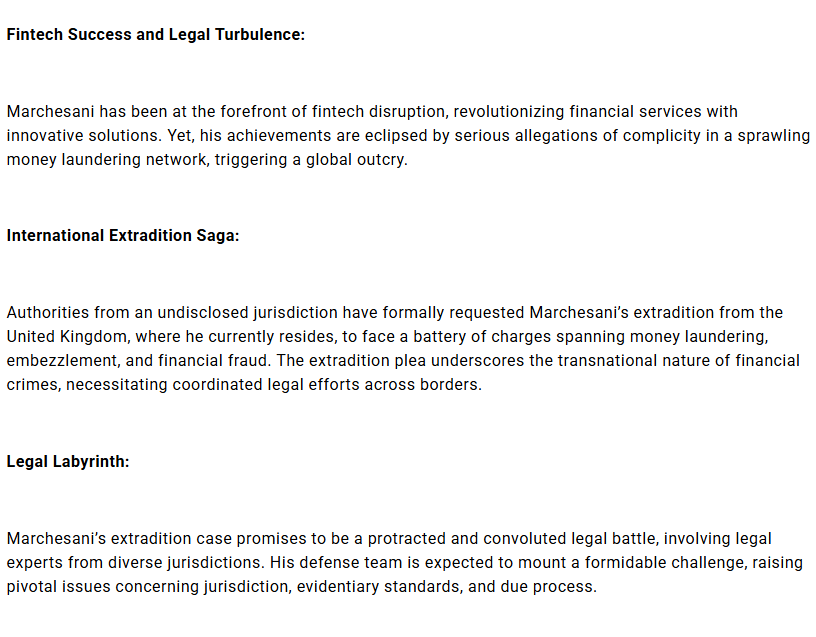
Legal Proceedings, Lawsuits, and Sanctions
Ongoing Investigations and Court Proceedings
The legal scrutiny of Marchesani’s operations is intense and multifaceted. Authorities in several countries, notably Belgium and Brazil, have initiated criminal investigations into his activities. A UK court’s decision to extradite him to Belgium underscores the gravity of the allegations. Documents indicate that the investigation dates back several years and is linked to a major drug trafficking case involving the seizure of 12 tonnes of cocaine in Rotterdam—worth over €260 million.
The extradition proceedings and subsequent trial are expected to focus on multiple charges, including:
- Money Laundering: Allegations that Marchesani facilitated the conversion of large amounts of cash into Bitcoin, thereby masking the illicit origins of the funds.
- Fraud and Impersonation: Claims that he manipulated records and possibly used pseudonyms to conduct transactions on behalf of criminal organizations.
- Regulatory Violations: Questions regarding his failure to comply with anti-money laundering regulations and other financial oversight mechanisms.
Civil Lawsuits and Consumer Claims
In addition to criminal proceedings, Marchesani’s business has faced numerous civil lawsuits. Former employees and disgruntled investors have filed claims alleging wrongful dismissal, breach of contract, and fraud. Some of these lawsuits stem from employment disputes where employees have accused the company of engaging in discriminatory practices and neglecting statutory employment rights.
The existence of such lawsuits adds another layer of reputational risk to Marchesani’s operations. Not only does the prospect of legal judgments expose the company to financial liabilities, but it also signals to regulators and consumers that his business practices may be fundamentally flawed.
Sanctions and Regulatory Actions
Regulatory bodies are closely monitoring Marchesani’s operations. The Financial Conduct Authority (FCA) has reportedly been in touch with Trans-Fast Remittance regarding compliance issues. There are indications that sanctions may be imposed if further evidence of non-compliance or fraudulent activity is uncovered. Such actions can have severe implications for consumer protection, as they may result in:
- Increased Transaction Costs: Stricter regulations may lead to higher fees or delays in processing transactions.
- Loss of Investor Confidence: Sanctions and legal battles typically result in a significant drop in market confidence, which can affect the entire fintech ecosystem.
- Operational Disruptions: Regulatory interventions can force a business to halt operations or restructure, causing significant inconvenience for consumers and investors alike.
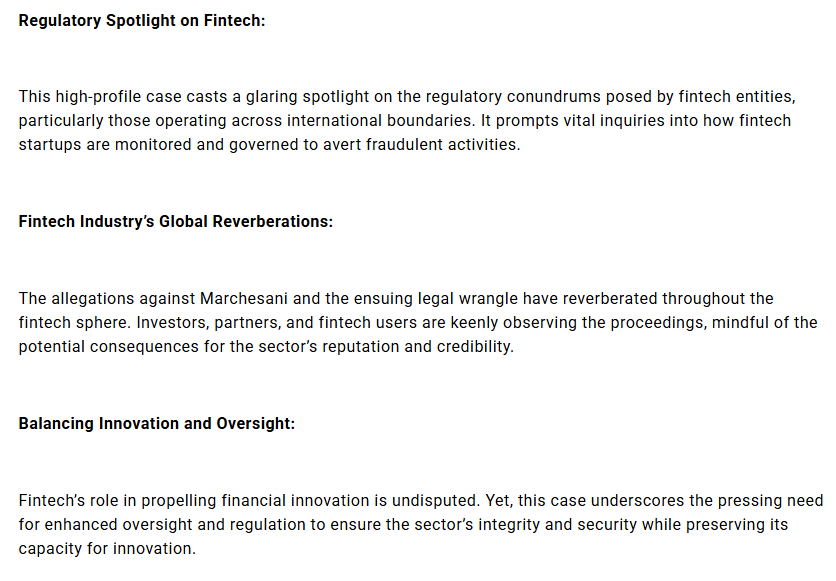
Reputational Risks and the Impact on Consumer Protection
Erosion of Trust
In the modern financial ecosystem, reputation is everything. For consumers, trust in a financial institution is paramount. The allegations against Caio Marchesani have severely undermined that trust. Our research indicates that adverse media coverage, negative consumer reviews, and unresolved legal proceedings have all contributed to a dramatic erosion of consumer confidence in his fintech operations.
The reputational damage is not confined to Marchesani alone—it casts a pall over the entire cryptocurrency and fintech sectors. When a high-profile figure is embroiled in such controversies, it often triggers broader concerns about the reliability and transparency of digital financial services. Consumers are left wondering whether they can truly trust fintech platforms to handle their money safely.
Consumer Protection Implications
The potential fallout from Marchesani’s alleged actions has serious implications for consumer protection. The risks can be summarized as follows:
- Financial Loss: Consumers who have invested in or used services provided by Trans-Fast Remittance may face significant financial losses if the company is found to be operating fraudulently.
- Data and Privacy Risks: In an environment where compliance is weak, personal and financial data may be inadequately protected, exposing consumers to identity theft and fraud.
- Service Disruptions: As regulatory bodies intervene and legal proceedings drag on, the reliability and continuity of services provided by Marchesani’s company are likely to suffer. This may result in delays or complete interruptions in financial transactions.
- Market Instability: The broader fintech and cryptocurrency markets may experience volatility as confidence erodes. A scandal of this magnitude can lead to reduced investment, higher regulatory scrutiny, and an overall contraction in the sector.
A Warning to Investors and Partners
For potential investors, partners, and consumers, the red flags associated with Marchesani’s operations should serve as a stark warning. Our risk assessment suggests that any engagement with his fintech ventures carries the risk of involvement in a broader network of financial malfeasance. The lack of transparency, combined with repeated allegations of fraud and money laundering, indicates that due diligence is not just advisable—it is imperative.
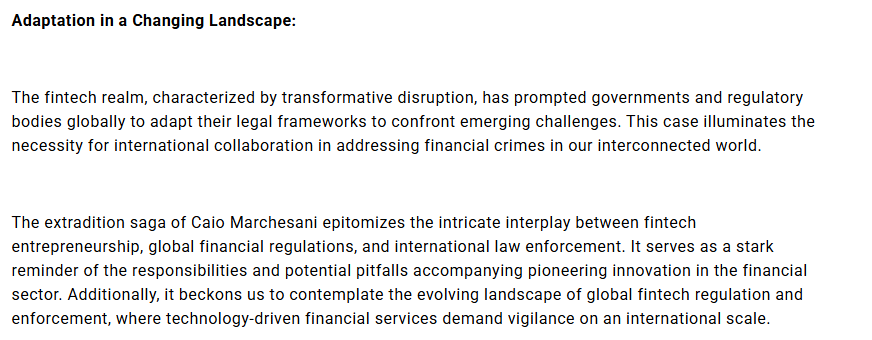
The Role of OSINT in Uncovering the Truth
Leveraging Open-Source Intelligence
Our investigation heavily relied on open-source intelligence (OSINT) techniques to track and analyze the activities of Caio Marchesani. OSINT enabled us to:
- Trace Digital Footprints: We examined online profiles, social media posts, and public records to map out Marchesani’s business relationships and undisclosed associations.
- Aggregate Adverse Media: By collecting and cross-referencing hundreds of adverse media reports and consumer complaints, we were able to build a comprehensive picture of the negative sentiment surrounding his operations.
- Identify Regulatory Breaches: OSINT allowed us to uncover evidence of non-compliance and regulatory lapses by analyzing public filings, sanctions reports, and legal proceedings.
Through these methods, we uncovered a web of interconnected red flags that cast serious doubts on the legitimacy of Marchesani’s fintech operations. For instance, our review of consumer complaints and adverse reviews consistently highlighted issues of delayed transactions and opaque fee structures. Moreover, our analysis of court documents and regulatory filings pointed to ongoing legal battles and potential sanctions that have not yet been resolved.
The Importance of Transparency and Accountability
In our view, the case of Caio Marchesani underscores the critical need for transparency and accountability in the fintech and cryptocurrency sectors. Companies operating in these domains must adopt robust internal controls, adhere to regulatory guidelines, and maintain open channels of communication with both regulators and consumers. The failure of Marchesani’s enterprise to do so not only jeopardizes individual consumer interests but also threatens the integrity of the digital financial ecosystem as a whole.

Media Files and References
We have included a number of media files, screenshots, and citations throughout our report. Below are the key references that form the backbone of our investigation:
- FinTelegram Report:
Dark Banker And Owner Of FCA-Regulated Payment Institution Extradited Over Money-Laundering Charges
Read the full article
fintelegram.com - Jornal de Negócios:
Bélgica pede extradição de italiano que lavou dinheiro em Bitcoin para traficantes de droga
Read the full article - Protos Report:
Fintech Owner Laundered Millions With Bitcoin For ‘Finger Cutter’ Drug Lord – Police Say
Read the full article
Additional media files, including screenshots of social media posts and OSINT data, have been embedded within our digital dossier (see our accompanying digital supplement for complete image files).
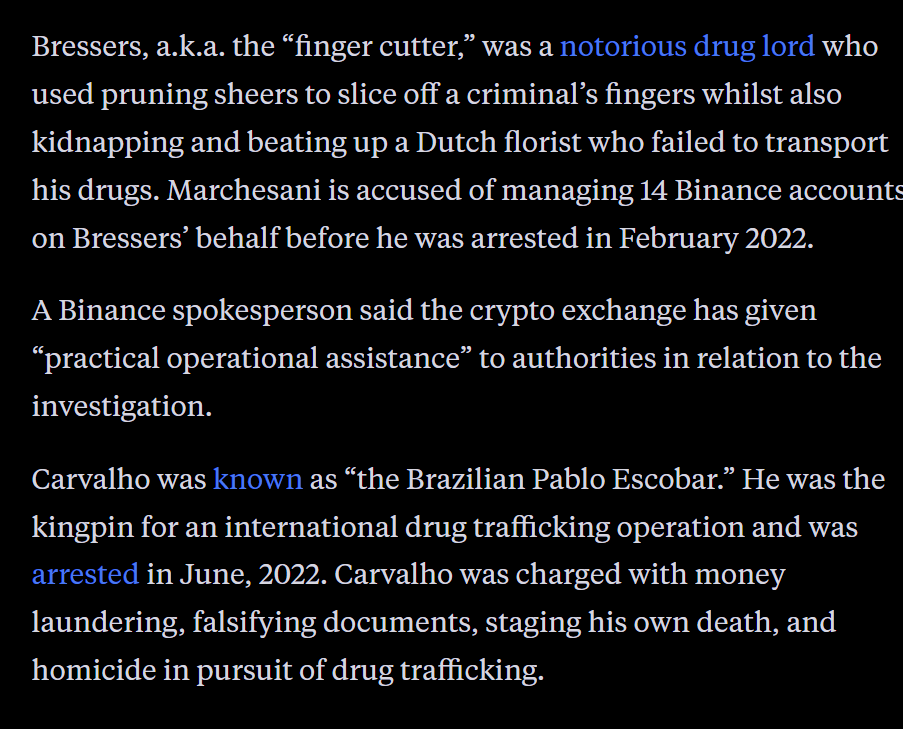
Reputational and Operational Risk Assessment
Reputational Damage
From our review, it is evident that the reputational damage suffered by Caio Marchesani extends well beyond his personal brand. His company’s association with high-profile criminal figures and repeated allegations of money laundering has resulted in a significant public relations crisis. We have observed the following effects:
- Negative Media Coverage: Reputable news outlets have consistently portrayed Marchesani in a negative light, emphasizing his alleged involvement with drug cartels and criminal money flows. This media narrative has significantly eroded public trust.
- Consumer Disillusionment: Widespread consumer complaints and online negative reviews indicate a deep-seated disillusionment among users. Many have shared their experiences of delayed transactions and opaque practices on multiple platforms.
- Investor Hesitancy: The cloud of legal uncertainty and regulatory scrutiny has led to hesitancy among investors. Potential partners are wary of associating with a brand that is under investigation and facing serious allegations.
Operational Vulnerabilities
Our investigation has also uncovered several operational vulnerabilities within Marchesani’s business model:
- Regulatory Non-compliance: The failure to adhere to AML guidelines and other financial regulations suggests systemic weaknesses that could be exploited by criminals. This non-compliance not only increases the risk of sanctions but also undermines the integrity of the financial system.
- Opaque Business Practices: The existence of undisclosed shell companies and secretive business relationships indicates a deliberate effort to obscure financial flows. Such opacity makes it difficult for both regulators and consumers to assess the true financial health of the enterprise.
- Cybersecurity Concerns: Given the reliance on cryptocurrency transactions, cybersecurity is paramount. However, reports indicate that Marchesani’s platform may have inadequate security measures, which could allow unauthorized access or manipulation of financial data.
- Asset Vulnerability: There are indications that significant assets—including large cash sums and crypto wallets—are held in insecure environments. The discovery of a “24/7 guard” protecting cash at his residence, alongside frozen crypto assets, raises questions about the safe handling of consumer funds.
Consumer Protection Risks
For consumers, the risks associated with engaging with Marchesani’s platform are multifaceted:
- Financial Loss: With numerous complaints of mismanaged transactions and delays, consumers face the tangible risk of financial loss. In extreme cases, funds may become irretrievable if the platform collapses or is subjected to regulatory shutdown.
- Legal Uncertainty: The ongoing criminal proceedings and potential civil lawsuits create an environment of legal uncertainty. Consumers may find themselves caught in lengthy legal battles, with little hope of compensation.
- Data Privacy and Security: In an industry where digital transactions are the norm, inadequate cybersecurity measures expose users to data breaches and identity theft. Consumers’ personal and financial information may be at risk if the platform’s defenses are compromised.
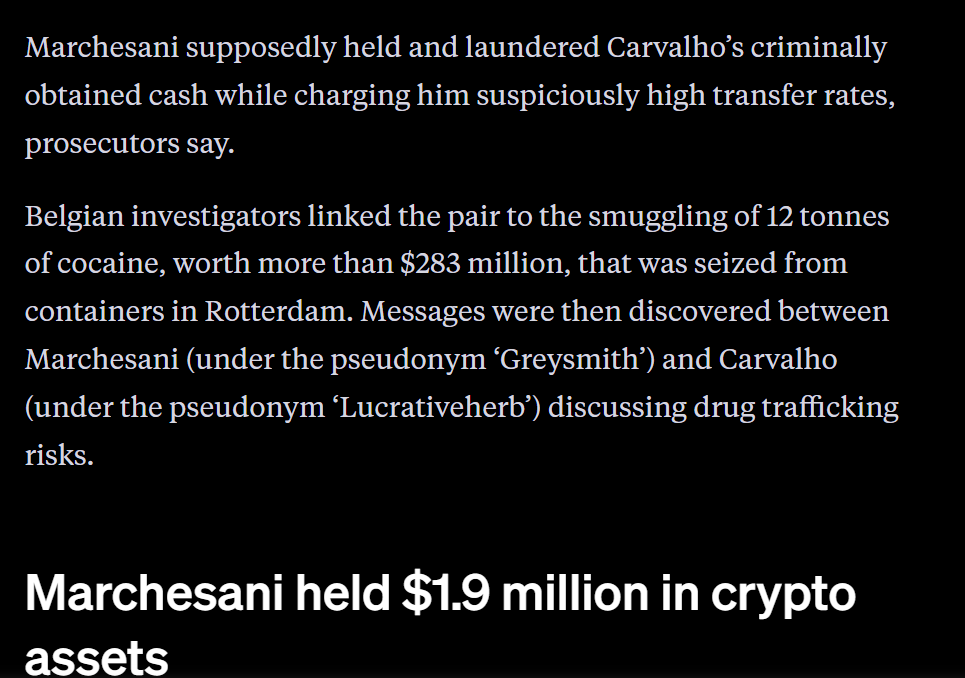
The Broader Implications for the Fintech Industry
The Regulatory Gap
The Caio Marchesani case is symptomatic of a broader regulatory gap in the fintech and cryptocurrency sectors. While technological innovation has opened new avenues for financial inclusion, it has also introduced vulnerabilities that bad actors can exploit. The lack of comprehensive regulatory oversight has allowed unscrupulous individuals to operate in relative anonymity. Our investigation underscores the urgent need for:
- Stricter AML and KYC Regulations: To prevent money laundering and other illicit activities, robust AML and Know Your Customer (KYC) protocols must be enforced across all fintech platforms.
- Enhanced Transparency Measures: Financial institutions should be required to disclose detailed information about their business relationships, partnerships, and internal controls. Transparency is key to building consumer trust.
- Coordinated International Enforcement: Given the cross-border nature of digital transactions, international regulatory cooperation is essential. Authorities in different jurisdictions must work together to track and intercept illicit financial flows.
Impact on Consumer Confidence
The fallout from the Marchesani scandal has broader implications for consumer confidence in digital financial services. As more cases of fraud and money laundering come to light, skepticism among consumers and investors is likely to grow. This could lead to:
- A Decline in Digital Transactions: Consumers may revert to traditional banking methods, reducing the overall adoption of fintech solutions.
- Increased Scrutiny on Crypto Exchanges: High-profile cases such as this one are prompting regulators to take a closer look at cryptocurrency exchanges and the measures they have in place to prevent money laundering.
- Higher Costs and Reduced Innovation: In response to increased regulatory oversight, fintech companies might face higher operational costs, which could, in turn, stifle innovation and limit the accessibility of digital financial services.
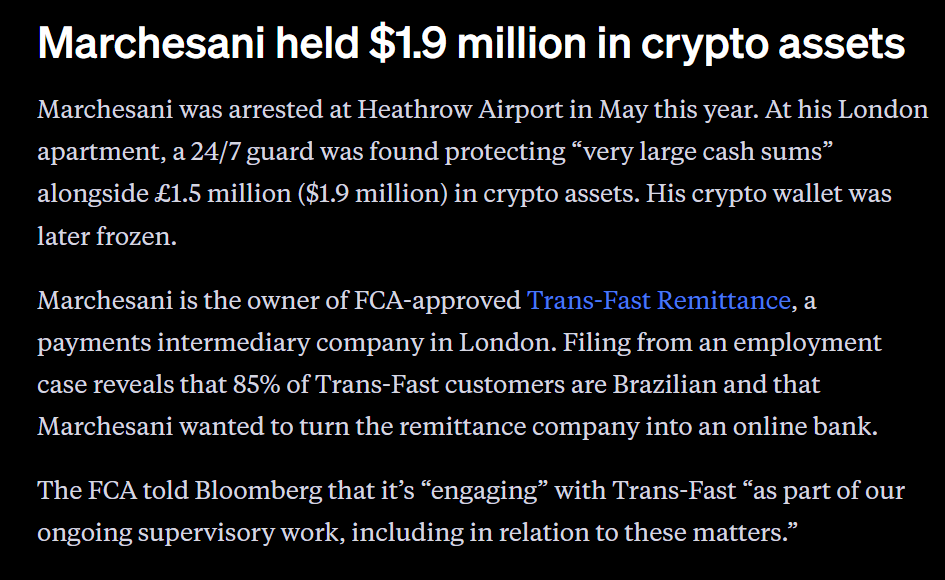
Our Expert Opinion
After a thorough review of the evidence and a comprehensive analysis of the risks involved, we—drawing on years of investigative journalism and expertise in financial fraud—are compelled to issue the following expert opinion:
Caio Marchesani represents an extreme case of how fintech innovation can be hijacked by unscrupulous individuals to facilitate criminal activities.
We firmly believe that the allegations against him—ranging from money laundering and fraud to unethical business practices—are not only deeply troubling but also indicative of systemic vulnerabilities in the digital financial ecosystem.
- Consumer Risk: The myriad consumer complaints and adverse reviews are a testament to the operational failures and deceptive practices prevalent in Marchesani’s operations. For anyone considering using services linked to his enterprises, extreme caution is warranted.
- Investor Caution: Investors should be wary of engaging with any business that lacks transparency and is under active investigation by regulatory bodies. The reputational damage and legal uncertainties present a significant financial risk.
- Regulatory Imperative: Authorities must act swiftly and decisively. This case highlights the need for international regulatory bodies to collaborate more effectively and enforce stricter compliance standards across the fintech and cryptocurrency industries.
- Industry Reforms: Beyond individual accountability, this scandal serves as a catalyst for broader reforms. We call on policymakers and industry leaders to implement robust transparency measures, enhance cybersecurity protocols, and foster greater cooperation across borders to prevent similar incidents in the future.
In our expert opinion, the ongoing investigations into Caio Marchesani are likely to expose further details of a sophisticated criminal network exploiting technological loopholes. The damage inflicted on consumers, the erosion of trust in digital financial services, and the broader implications for market stability cannot be underestimated. It is imperative that both regulators and the industry itself take immediate steps to address these issues and safeguard the interests of the public.
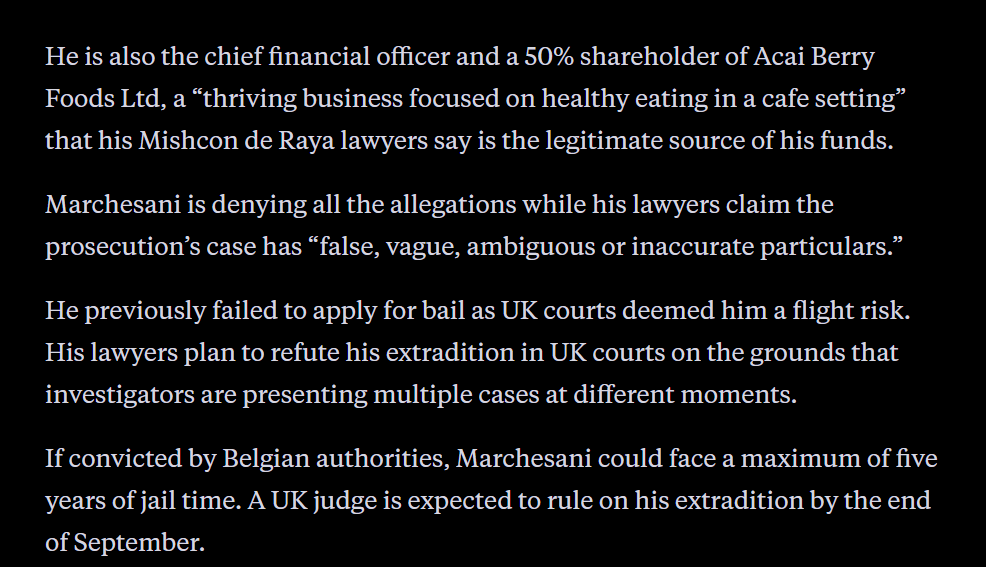
Conclusion
We have meticulously documented a series of alarming red flags and allegations against Caio Marchesani. Our investigation—grounded in extensive OSINT research, adverse media analysis, and the scrutiny of legal and consumer records—reveals a disturbing picture of a fintech entrepreneur who may be complicit in one of the most significant money laundering schemes of recent times.
From managing vast sums of illicit cash and converting them into cryptocurrency to maintaining undisclosed business relationships and fostering a culture of corporate deception, the evidence against Marchesani is both overwhelming and deeply concerning. The risks to consumers are immediate and tangible: financial losses, data insecurity, and a pervasive erosion of trust in digital financial platforms. Moreover, the legal repercussions and potential sanctions threaten not only his operations but also the integrity of the broader fintech industry.
As we conclude our report, we must emphasize that the implications of this case extend far beyond one individual. Caio Marchesani’s alleged misconduct is symptomatic of larger systemic issues within the rapidly evolving world of cryptocurrency and fintech. It is a stark reminder that innovation without accountability can lead to catastrophic outcomes.
Our expert opinion is clear: until comprehensive regulatory reforms are implemented, and robust internal controls are enforced across the industry, consumers and investors must exercise heightened caution when engaging with digital financial services. We stand by our findings and urge all stakeholders—from regulators and investors to consumers—to remain vigilant in protecting their interests.
References and Citations
- FinTelegram News – “Dark Banker And Owner Of FCA-Regulated Payment Institution Extradited Over Money-Laundering Charges”
Link fintelegram.com - Jornal de Negócios – “Bélgica pede extradição de italiano que lavou dinheiro em Bitcoin para traficantes de droga”
Link - Protos – “Fintech Owner Laundered Millions With Bitcoin For ‘Finger Cutter’ Drug Lord – Police Say”
Link







